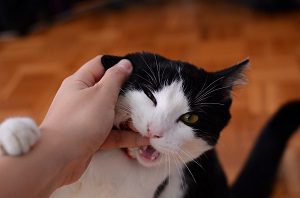Most of us know that cats are easily stressed. Even a minor variation in your cat’s daily routine can make him a nervous wreck!
Major changes, like moving or the arrival of a new cat, dog or baby into the household can send even the most mellow kitty into crazy mode. In these circumstances, learning about cat stress relievers is a must.
One of the reasons cats get stressed might be because cats equate routine with control. Change the routine, they lose control. Or at least that’s the way they see it. If cats don’t feel like they’re in control of their environment, then tend to get anxious.
Many people don’t realize how we can create stress for our cat. Here’s a list of some triggers, as well as ways to relieve your cat’s stress.
WATCH MY VIDEO: why your cat is a nervous wreck!
10 Things That Stress Your Cat Out
1. Punishing Him for Acting Like a Cat. Don’t ever hit your cat – even a slight swat will accomplish only one thing – and that’s teaching him to fear you.
Yelling has the same effect – it will scare him off but won’t teach the cat what behavior you don’t like.
Instead of yelling at your cat or physically assaulting them (I mean it – knock it off!), distract him with a toy or activity to SHOW him what you want him to do instead of whatever behavior he’s doing that’s bugging you.
Teach your cat what’s acceptable and what’s not by SHOWING him. And when he does right – reward him with affection and/or treats.
And make sure your cat has things he can climb on and scratch. Get him a scratching post or kitty play condo. These things will keep him busy, active, and away from your stuff!

Instead of talking to your cat then getting frustrated when he gives you a blank stare, try teaching your kitty instead.
For example, show the cat what you’d like him to do (sit, for example) – by gently pushing him into a sitting position – then reward him with affection and treats.
If you want him to pee in the litter box, pick him up, place him in the litter box – when he’s done, reward him with affection and/or treats. Whenever the cat is doing something you don’t want him to do, redirect him to what you do want him to do.
3. Grasping His Head. Dogs like it when people come up to them, cup their head in our hands, and ruffle their ears…know what I mean?
But cats hate this. If you’ve approached a cat this way, I’m sure you’re noticed they throw it in reverse immediately and recoil.
Cats are much more comfortable with gentle, long strokes from the head or neck area to the tail, or a gentle scratching around the ears or under the chin.

In order to be comfortable, your cat needs to maintain his ability to move freely and escape.
Sometimes cats will get stressed out when people hold them, even when we’re being affectionate.
Many a human chest (including my own!) has been torn to shreds by a cat launching off of us with claws out!
The general rule is that cats like to have all of their interactions on their own terms…it’s how they control their environment like we talked about earlier.
It’s just best to let the cat come to you instead of trying to catch or restrain it.

Cats are clean animals by nature. I had a female cat who refused to use the litter box if it was the least bit dirty!
The litter box, ideally, should be scooped at least once daily (more often if you have more than one cat using it), and dumped with litter replaced at least every week.
Every two weeks is acceptable, but….well…gross in my opinion. Would you want to pee in a toilet that hadn’t been flushed in two weeks? Eeeww!
There are self-cleaning litter boxes out there. If you really hate scooping cat litter, maybe you could give one of these a try.
6. Picking a Bad Location for the Litter Box. How would you like it if your toilet was located in the middle of the living room? The same logic applies to cats.
Don’t put the cat’s litter box in an open, noisy, high-traffic area of your home. They want a private, safe spot to do their business just like us.
Put the litter box in a quiet area of your home where the cat isn’t likely to encounter people, other pets or loud appliances. If your cat is older, make sure the litter box is in a location where it is easily accessible to your cat.

But it’s also really (really really) stupid of you to be surprised when he goes for it and sinks his claws and teeth into you!
Don’t get mad at your cat for being a cat. If you mimmick the behavior of prey, he’ll attack. Use toys instead of your fingers and toes!

It’s not OK. Read that again. IT’S NOT OK.
Number one, cats really shouldn’t be eating a diet of dry food alone – they need a moist diet. So leaving a big bowl of dry food out for them to eat off of for days just isn’t a good thing.
Also, many cats will gorge themselves in you leave out a large amount of food. They’ll eat the bulk it if within hours after you leave, then throw up and have nothing to eat until you return.
This is stressful for your cat, not to mention downright dangerous for their health.

And finally, your cat could injure himself or become ill during your absence and no one would know.
I recommend asking a neighbor, friend, relative, or professional pet sitter to stop by each day during your absence to feed and water your cat, scoop the litter box, and spend a few minutes with him to make sure he’s OK, content and healthy.
If you have even one fellow cat owner in your neighborhood, then you almost surely have an available cat-sitter. Most cat owners are happy to help take care of someone’s kitty while they’re away. And you can return the favor for them next time they go on vacation!
For help finding a good cat sitter, read my post, How to Find a Good Cat Sitter (includes video).
For information about leaving your cat home alone, check out this post (includes video):
Leaving Cats Home Alone: What to Do Instead
Separation Anxiety in Cats: How to Help Your Cat!
9. Using Scented Candles, Plug-Ins, Perfume, or Strong Smelling Chemicals. Cats are very sensitive to odors. They can easily become overwhelmed by smells in the air, on clothing or bedding, and even on you.
Try to keep your use of chemicals of all kinds to a minimum, especially the ones that have a strong odor.
Try using organic, non-toxic home cleaners instead of toxic pine-based floor cleansers, chemical wet mops, or ammonia/bleach-based cleaners.
Remember your cat lives on the floor, sleeps in the bed with the blanket you used half a gallon of strong smelling fabric softener on, and they visit the litter box often that might have a terribly strong bleach smell from cleaning.
Keep in mind that everything you smell, they smell ten times stronger.

This is way worse when you bring a strange cat home, especially if they aren’t properly introduced.
Introducing a new cat to the family should be done carefully. Set them up in a separate area first, letting them get used to each other gradually, at their own pace. This will help reduce the risk of their fighting and keep everyone’s stress levels down.
For more information on fighting, read this article, How To Stop Cats From Fighting, and How to Break Up a Cat Fight. Both articles have videos included!
 How to Understand Your Cat
How to Understand Your Cat
If you’d like help communicating with your cat and understanding what you cat is trying to tell you, you might find this eBook very useful.
It’s called, The Cat Language Bible. You can read my complete review here.
 Help With Cat Training
Help With Cat Training
If you need help with your cat’s behavior or other issues, I suggest a cat training program eBook called, The Complete Cat Training Guide. This eBook covers real-life cat behavior issues and comes with a money-back guarantee. You can read my full review here.
 I Hope This Helped!
I Hope This Helped!
Thank you for visiting my website. I hope this post will help you reduce your cat’s stress and give them a peaceful, happy life!
I donate 10% of my earnings to animal charities. You can see a list of the charities I donate to here.
If you found my site to be helpful, please share it with your friends and family. Thanks so much! Debra





 I Hope This Helped!
I Hope This Helped!

Great advice here particularly when it comes to not getting mad at your cat for being a cat. This happens across the board. People get mad at cats for being cats, dogs for being dogs, rabbits for being rabbits…
Cats are natural predators and roamers so yes, if you tease them with a body part, they will go after it and quite frankly, the person doing this deserves it!:)
With regards to food, I can attest first hand dry food is not good for them. My cat ate dry food for a while 9I didnt know better at the time) and he developed large kidney stones from the massive amounts of calcium they inject into dry food.
Vet said to throw away all dry food and feed him wet which he did and he never got stones again.
Amazing work you are doing for the animals, keep it up!
I also had a cat who developed kidney disease – i also didn’t know any better about the dry food vs moist food. She still lived 20 years though so fortunately she still had a long, happy life. Thanks so much for the comment!
This is a very useful article to help us do the best for our cats. I think many people consider that bringing another cat into the household will cheer the existing cat up and give him/her a friend to play with. On the whole though, cats seem to be happy with their own company as the only cat in the house.
Each of our animals have their own needs and a cat needs a different approach than say a dog. You are right about how to pet your cat. My husband used the dog method and got himself a nasty scratch from a relative’s cat.
Cat’s do tell you though if they don’t like what you’re doing. Their eyes and ears change, their tail moves differently and they have a different demeanour if they are about to strike you. Learning their language is a good idea.
I have often wondered if those plug-ins for stressed cats work. Have you used them at all? We have one in the UK called Feliway but I’m a bit skeptical. Ches
I’ll soon be posting an article about the ways cats communicate with us – check back in a week or so and you’ll see it in the new posts. I purchased the Adaptil collar for my dog and it did seem to help her stay come. I would strongly recommend the Adaptil Plug-ins for cats who are stressed out. Thanks so much for your comments!
Our cat uses her litter box but still leaves little drops of pee in our bedroom. Tried everything, we don’t have carpeting anywhere else in the house. Since it was all removed,with the bedroom the only carpet in the house,that’s when she started. Also a month in fla but I have a cat keeper who takes care of her. That’s when it all started about 1 yr ago…loosing my mind 7 don’t want 2 get rid of her. Help. No medical problems there. Thank you
Here are two articles that might help you. How to Get Your Cat to Use the Litterbox and How to Get Your Cat to Stop Peeing on the Carpet. I hope these help!